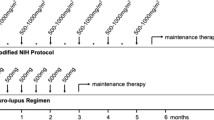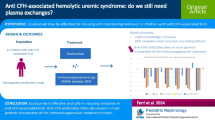Abstract
Background
Anti-complement factor H (anti-CFH) antibody-associated hemolytic uremic syndrome (HUS) is an important cause of acute kidney injury in Indian children. While management comprises plasma exchange and immunosuppression, information on the impact on serial antibody titers and outcomes is limited.
Methods
This retrospective study included 45 patients with anti-CFH-associated HUS who were followed for ≥12 months. Following the initial plasma exchange sessions, patients received prednisolone and either intravenous (IV) cyclophosphamide (n = 31) or IV rituximab (n = 14), followed by maintenance immunosuppression.
Results
The median anti-CFH antibody titers fell from 3,215.5 [interquartile range (IQR) 1,977.9–8,453.9 to 414.6 (IQR 251.6–1,368.2) AU/ml with plasma exchange therapy (P < 0.0001), and the decline was similar with three, five, or seven plasma exchange sessions (P = 0.08). Serial anti-CFH titers were similar in patients receiving IV cyclophosphamide- and rituximab-based regimens during the 12-month follow-up (P = 0.63). Renal outcomes and relapse frequencies at the 15.4-month follow-up were comparable. Seven patients relapsed 6.5 (IQR 2.2–12.3) months from treatment onset. Patients with relapse had higher antibody titers during remission (P = 0.017). Titers of ≥1,300 AU/ml at 6 months predicted subsequent relapses.
Conclusions
Our patients with anti-CFH antibody-associated HUS showed a significant fall in antibody titers following daily plasma exchange sessions. Therapy with cyclophosphamide- or rituximab-based regimens was associated with similar outcomes and a comparable decline in antibody titers.


Similar content being viewed by others
References
Sinha A, Gulati A, Saini S, Blanc C, Gupta A, Gurjar BS, Saini H, Kotresh ST, Ali U, Bhatia D, Ohri A, Kumar M, Agarwal I, Gulati S, Anand K, Vijayakumar M, Sinha R, Sethi S, Salmona M, George A, Bal V, Singh G, Dinda AK, Hari P, Rath S, Dragon-Durey MA, Bagga A, Indian HUS Registry (2014) Prompt plasma exchanges and immunosuppressive treatment improves the outcomes of anti-factor H autoantibody-associated hemolytic uremic syndrome in children. Kidney Int 85:1151–1160
Jozsi M, Licht C, Strobel S, Zipfel SL, Richter H, Heinen S, Zipfel PF, Skerka C (2008) Factor H autoantibodies in atypical hemolytic uremic syndrome correlate with CFHR1/CFHR3 deficiency. Blood 111:1512–1514
Dragon-Durey MA, Sethi SK, Bagga A, Blanc C, Blouin J, Ranchin B, Andre JL, Takagi N, Cheong HI, Hari P, Le Quintrec M, Niaudet P, Loirat C, Fridman WH, Fremeaux-Bacchi V (2010) Clinical features of anti-factor H autoantibody-associated hemolytic uremic syndrome. J Am Soc Nephrol 21:2180–2187
Geerdink LM, Westra D, van Wijk JA, Dorresteijn EM, Lilien MR, Davin JC, Komhoff M, Van Hoeck K, van der Vlugt A, van den Heuvel LP, van de Kar NC (2012) Atypical hemolytic uremic syndrome in children: complement mutations and clinical characteristics. Pediatr Nephrol 27:1283–1291
Hofer J, Giner T, Jozsi M (2014) Complement factor H-antibody-associated hemolytic uremic syndrome: pathogenesis, clinical presentation and treatment. Semin Thromb Hemost 40:431–443
Ariceta G, Besbas N, Johnson S, Karpman D, Landau D, Licht C, Loirat C, Pecoraro C, Taylor CM, Van de Kar N, Vandewalle J, Zimmerhackl LB; European Paediatric Study Group for HUS (2009) Guideline for the investigation and initial therapy of diarrhea-negative hemolytic uremic syndrome. Pediatr Nephrol 24:687–696
Sinha A, Tiwari AN, Chanchlani R, Seetharamanjaneyulu V, Hari P, Bagga A (2012) Therapeutic plasmapheresis using membrane plasma separation. Indian J Pediatr 79:1084–1086
Schwartz GJ, Munoz A, Schneider MF, Mak RH, Kaskel F, Warady BA, Furth SL (2009) New equations to estimate GFR in children with CKD. J Am Soc Nephrol 20:629–637
Noris M, Remuzzi G (2009) Atypical hemolytic-uremic syndrome. N Engl J Med 361:1676–1687
Williams ME, Balogun RA (2014) Principles of separation: indications and therapeutic targets for plasma exchange. Clin J Am Soc Nephrol 9:181–190
Johnson S, Stojanovic J, Ariceta G, Bitzan M, Besbas N, Frieling M, Karpman D, Landau D, Langman C, Licht C, Pecoraro C, Riedl M, Siomou E, van de Kar N, Walle JV, Loirat C, Taylor CM (2014) An audit analysis of a guideline for the investigation and initial therapy of diarrhea negative (atypical) hemolytic uremic syndrome. Pediatr Nephrol. doi:10.1007/s00467-014-2817-4
Noone D, Waters A, Pluthero FG, Geary DF, Kirschfink M, Zipfel PF, Licht C (2014) Successful treatment of DEAP-HUS with eculizumab. Pediatr Nephrol 29:841–851
Lee BH, Kwak SH, Shin JI, Lee SH, Choi HJ, Kang HG, Ha IS, Lee JS, Dragon-Durey MA, Choi Y, Cheong HI (2009) Atypical hemolytic uremic syndrome associated with complement factor H autoantibodies and CFHR1/CFHR3 deficiency. Pediatr Res 66:336–340
Dragon-Durey MA, Loirat C, Cloarec S, Macher MA, Blouin J, Nivet H, Weiss L, Fridman WH, Fremeaux-Bacchi V (2005) Anti-Factor H autoantibodies associated with atypical hemolytic uremic syndrome. J Am Soc Nephrol 16:555–563
Sana G, Dragon-Durey MA, Charbit M, Bouchireb K, Rousset-Rouviere C, Berard E, Salomon R, Fremeaux-Bacchi V, Niaudet P, Boyer O (2014) Long-term remission of atypical HUS with anti-factor H antibodies after cyclophosphamide pulses. Pediatr Nephrol 29:75–83
Hofer J, Janecke AR, Zimmerhackl LB, Riedl M, Rosales A, Giner T, Cortina G, Haindl CJ, Petzelberger B, Pawlik M, Jeller V, Vester U, Gadner B, van Husen M, Moritz ML, Wurzner R, Jungraithmayr T; German-Austrian HUS Study Group (2013) Complement factor H-related protein 1 deficiency and factor H antibodies in pediatric patients with atypical hemolytic uremic syndrome. Clin J Am Soc Nephrol 8:407–415
Scully M, Hunt BJ, Benjamin S, Liesner R, Rose P, Peyvandi F, Cheung B, Machin SJ and on behalf of British Committee for Standards in Haematology (2012) Guidelines on the diagnosis and management of thrombotic thrombocytopenic purpura and other thrombotic microangiopathies. Br J Haematol 158:323–335
Kwon T, Dragon-Durey MA, Macher MA, Baudouin V, Maisin A, Peuchmaur M, Fremeaux-Bacchi V, Loirat C (2008) Successful pre-transplant management of a patient with anti-factor H autoantibodies-associated haemolytic uraemic syndrome. Nephrol Dial Transplant 23:2088–2090
Noris M, Caprioli J, Bresin E, Mossali C, Pianetti G, Gamba S, Daina E, Fenili C, Castelletti F, Sorosina A, Piras R, Donadelli R, Maranta R, van der Meer I, Conway EM, Zipfel PF, Goodship TH, Remuzzi G (2010) Relative role of genetic complement abnormalities in sporadic and familial aHUS and their impact on clinical phenotype. Clin J Am Soc Nephrol 5:1844–1859
Fremeaux-Bacchi V, Fakhouri F, Garnier A, Bienaime F, Dragon-Durey MA, Ngo S, Moulin B, Servais A, Provot F, Rostaing L, Burtey S, Niaudet P, Deschenes G, Lebranchu Y, Zuber J, Loirat C (2013) Genetics and outcome of atypical hemolytic uremic syndrome: a nationwide French series comparing children and adults. Clin J Am Soc Nephrol 8:554–562
Diamante Chiodini B, Davin JC, Corazza F, Khaldi K, Dahan K, Ismaili K, Adams B (2014) Eculizumab in anti-factor H antibodies associated with atypical hemolytic uremic syndrome. Pediatrics 133:e1764–1768
Green H, Harari E, Davidovits M, Blickstein D, Grossman A, Gafter U, Gafter-Gvili A (2014) Atypical HUS due to factor H antibodies in an adult patient successfully treated with eculizumab. Ren Fail 36:1119–1121
Moore I, Strain L, Pappworth I, Kavanagh D, Barlow PN, Herbert AP, Schmidt CQ, Staniforth SJ, Holmes LV, Ward R, Morgan L, Goodship TH, Marchbank KJ (2010) Association of factor H autoantibodies with deletions of CFHR1, CFHR3, CFHR4, and with mutations in CFH, CFI, CD46, and C3 in patients with atypical hemolytic uremic syndrome. Blood 115:379–387
Acknowledgments
Collaboration between the All India Institute of Medical Sciences, New Delhi and Laboratoire d'Immunologie, Hôpital Européen Georges Pompidou, Paris, France, was possible through the Indo-French Centre for the Promotion of Advanced Research (CEFIPRA) Project 4,703. The study was supported by the Department of Biotechnology, Government of India, 102/IFD/SAN/PR2624/2010–11). We gratefully acknowledge help with statistical analysis by M. Kalaivani, Department of Biostatistics, All India Institute of Medical Sciences, Ansari Nagar, New Delhi.
Author information
Authors and Affiliations
Corresponding author
Rights and permissions
About this article
Cite this article
Khandelwal, P., Gupta, A., Sinha, A. et al. Effect of plasma exchange and immunosuppressive medications on antibody titers and outcome in anti-complement factor H antibody-associated hemolytic uremic syndrome. Pediatr Nephrol 30, 451–457 (2015). https://doi.org/10.1007/s00467-014-2948-7
Received:
Revised:
Accepted:
Published:
Issue Date:
DOI: https://doi.org/10.1007/s00467-014-2948-7




